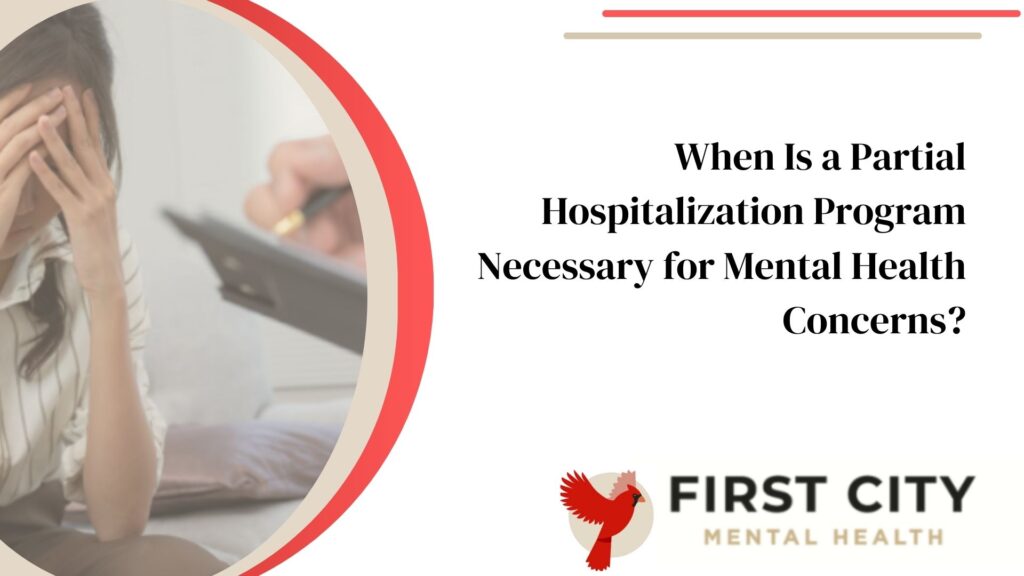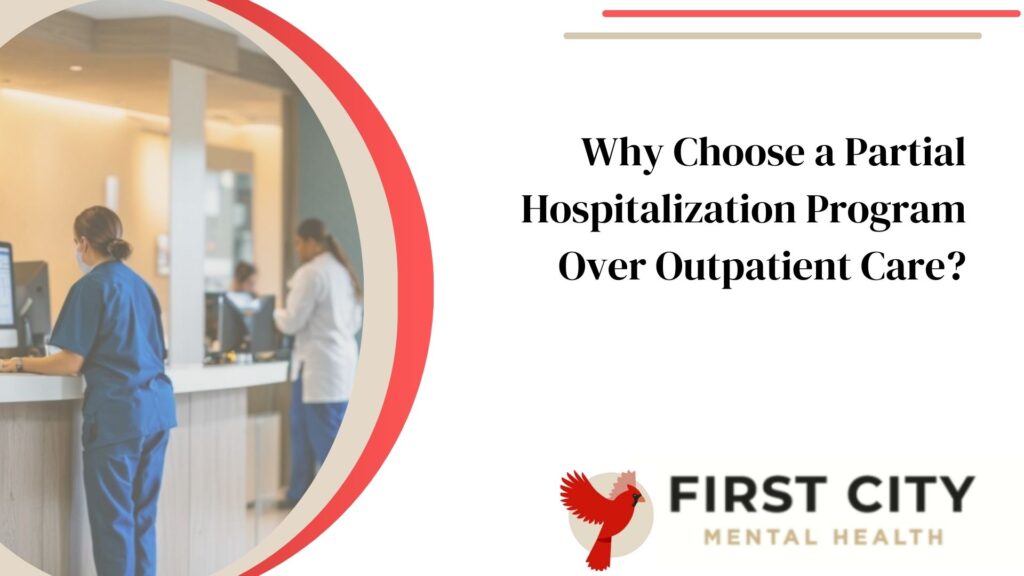
What Are The Benefits of Residential Mental Health Programs?
August 6, 2025
What is Residential Mental Health Treatment?
August 11, 2025Struggling with mental health can be overwhelming, especially when you feel like outpatient care isn’t enough, but residential treatment feels too intense. If you’re looking for an intermediate solution that offers substantial support for behavioral health conditions without requiring a full-time stay, a partial hospitalization program might be what you need.
A vital benefit of a Partial Hospitalization Program (PHP) is that it provides intensive therapy while allowing patients to live at home. Programs usually last 30-45 days and include individual and group therapies and medication management.
This blog will cover everything from the basics of PHP to how you can prepare for it. We’ll explore who needs it, the duration, the types of therapy offered, and why it’s a better option than some alternatives.
Key Takeaways
- A Partial Hospitalization Program (PHP) lasts 30-45 days and includes 6-8 hours of daily therapy.
- Participants receive group and individual therapies, medication management, and life skills training.
- Patients live at home or in community housing, balancing intensive treatment with daily responsibilities.
What Is a Partial Hospitalization Program?
Partial Hospitalization Kokomo Programs (PHP) offer intensive mental health care while allowing patients to live at home. This structured day program lasts 30-45 days and is a middle step between residential care and outpatient services.
PHP aims to stabilize patients’ mental health concerns, helping them reintegrate into daily life.
Patients in a partial hospitalization program undergo various therapies and support activities for about 6-8 hours each day. The program includes group therapy, individual counseling, medication management, and other supportive services to enhance mental well-being.
Participants often reside in a community or sober housing off-site during the treatment period.
How Does a Partial Hospitalization Program Work?

Patients in a mental health Partial Hospitalization Program (PHP) attend therapeutic sessions during the day and return home each night. This setup balances intensive treatment and daily responsibilities, ideal for those who do not need 24-hour care but still require structured support.
Individuals typically participate in PHPs for about 30 to 45 days, attending sessions lasting 6-8 hours daily. These programs often serve as a step down from Residential Programs, providing necessary stability while preparing patients to reintegrate into society.
During their time in the program, patients engage in various forms of therapy, such as group therapy, individual counseling, and medication management. Group therapy fosters peer support and mutual understanding among participants with similar issues.
Individual therapy addresses specific personal needs through one-on-one sessions with mental health professionals. The treatment team works together to provide individualized care, including comprehensive evaluation, medication management, supportive counseling, and aftercare planning. Patients also receive medication management if prescribed medications are part of their treatment plan.
The aim is to help stabilize mental health so individuals can function independently, says Dr. Jane Smith, a psychiatrist specializing in partial hospitalization programs.
Therapeutic activities happen within a community setting but outside traditional hospital environments. These living arrangements, often called sober housing or community housing, provide structure without isolating patients from real-world experiences.
The ultimate goal is for individuals to gain the coping skills and self-confidence needed to live independently.
What Types of Therapy Are Offered in Partial Hospitalization Programs?
Partial hospitalization programs mental health recovery. The treatments cater to different needs and are designed to offer comprehensive care.
- Group Therapy: Participants engage in daily sessions that typically last several hours. This allows for peer support, sharing experiences, and learning from others facing similar challenges.
- Individual Therapy: Personal therapy sessions occur regularly, enabling tailored treatment plans. Therapists work one-on-one with individuals to address specific issues and track progress.
- Medication Management: Medical professionals monitor and adjust medications as necessary. Regular check-ins ensure the prescribed drugs are effective and side effects are appropriately managed.
- Life Skills Reintegration: Programs focus on teaching independent living skills essential for daily life. Strategies include managing stress, developing healthy routines, and improving social interactions.
- Cognitive Behavioral Therapy (C.B.T.): C.B.T. helps participants identify negative thinking patterns and replace them with positive thoughts. It reduces symptoms by changing how one thinks about and responds to situations.
- Dialectical Behavioral Therapy (D.B.T.): Dialectical Behavioral Therapy (DBT) is helpful for those dealing with extreme emotions or self-destructive behaviors. It teaches mindfulness, emotional regulation, distress tolerance, and interpersonal effectiveness skills, helping individuals understand and manage their thoughts and emotions.
- Family Therapy involves family members in the treatment process when appropriate. It can improve communication, resolve conflicts, and develop a supportive home environment.
- Occupational Therapy: Helps participants regain or develop new skills related to daily living activities and work-related tasks, enhancing their ability to function independently.
- Recreational Therapy: Uses recreational activities like art, music, or exercise to support recovery goals. These activities promote relaxation, creativity, physical health, and overall well-being.
- Psychotherapy: Includes various forms of talk therapy, such as psychodynamic therapy, which explores unconscious thoughts influencing behavior and emotions.
Understanding the duration of these programs can help set expectations for those considering this level of care.
When Is a Partial Hospitalization Program Necessary for Mental Health Concerns?

Patients who have completed a Residential Program but still need structured support often benefit from a Partial Hospitalization Program (PHP). PHPs can be an alternative to psychiatric inpatient hospitalization for those with acute psychiatric symptoms, providing a high level of support to stabilize acute symptoms and reduce the length of a hospital stay. This program is ideal for those ready to reintegrate into society while managing mental health issues.
PHP offers an intensive level of care that helps individuals transition back to their daily lives without being overwhelmed by their mental illness.
Mental health partial hospitalization programs include group therapy, individual therapy, medication management, and other forms of support. These services are essential when someone needs more structure than outpatient care can provide but do not require 24-hour supervision like in a residential setting.
This type of program is also beneficial for adults needing continuous treatment after leaving a residential facility in Indiana.
How Long Does a Partial Hospitalization Program Last?
An Indiana Partial Hospitalization Program (PHP) typically lasts between 30 and 45 days. This duration serves as a bridge for individuals stepping down from residential care but still requiring more intensive support than outpatient services provide. In comparison, an Intensive Outpatient Program (IOP) is less intensive and usually involves fewer hours per week, making it suitable for individuals who need increased support but can manage their time outside the program.
Participants engage in therapeutic programming for six to eight hours daily, including individual and group therapy sessions.
These programs offer flexibility while ensuring consistent care, making them a practical option for treating mental health issues. They help individuals transition smoothly into daily life with the necessary tools and coping strategies.
Adult partial hospitalization programs in Indiana maintain this structured yet supportive environment across various facilities, including those in Kokomo.
What Should You Bring to a Partial Hospitalization Program?
Partial hospitalization program (PHP) offers intensive treatment while allowing patients to live at home or in community housing. Knowing what to bring can help you be better prepared for the program.
Identification and Insurance Information
Always carry your photo I.D. and any relevant insurance cards. These documents are necessary for registration and billing purposes.
Medical Records
Bring copies of your medical records, including previous psychiatric evaluations, medication lists, and recent lab results. This information will help staff tailor your treatment plan and provide comprehensive health services designed to address your specific needs.
Comfortable Clothing
Wear comfortable clothing suitable for a full day of activities, such as group therapy sessions and individual counseling.
Personal Hygiene Items
Pack essential toiletries like toothbrushes, toothpaste, deodorant, and shampoo. Maintaining good hygiene is necessary during your stay.
Medications
Carry all current medications in their original prescription bottles. This ensures that dosages are followed correctly.
Notebook and Pen
Take notes during sessions to help remember key points discussed in therapy or educational groups.
Water Bottle and Snacks
Staying hydrated is crucial; a reusable water bottle can be convenient. If the facility allows it, some snack options might also be allowed.
A Positive Attitude
Mental preparedness is key to fully benefiting from the program. A positive attitude can greatly influence the effectiveness of treatment.
Emergency Contact Information
Have a list of emergency contacts readily available for staff in case they need to quickly reach someone on your behalf.
Bringing these essentials will make your time in partial hospitalization more productive and comfortable.
How to Prepare for a Partial Hospitalization Program?
After gathering what you need for an adult Partial Hospitalization Program, it is essential to prepare mentally and logistically. Planning can help make the transition smoother and ensure you get the most out of the program.
Complete a Residential Program
Ensure you have completed any required Residential Program before starting a Partial Hospitalization Program (PHP). This prepares you for the less intensive treatment phase.
Organize Your Daily Schedule
Prepare to attend 6-8 hours of therapeutic programming each day. Block this time off your calendar and inform family or roommates about your commitment.
Secure Community Housing
Arrange for community or sober housing if needed. Living off-site helps with reintegration into society while maintaining a safe environment.
Prepare Mentally for Therapy Sessions
Be ready to participate in various therapy sessions, including group therapy, individual therapy, and medication management. Open yourself up to these experiences fully.
Gather Necessary Documents
Collect insurance information, identification, and any medical records required for admission into an Indiana partial hospitalization program.
Pack Suitable Clothing and Personal Items
Bring comfortable clothing suitable for long days of therapy sessions. Include personal hygiene items, but avoid any prohibited items in the program guidelines.
Coordinate With Your Employer or School
Discuss your participation in the PHP with your employer or school administration. Arrange leave if necessary to focus solely on your mental health recovery during this period.
Set Goals for Recovery
Outline personal goals such as returning to work or school post-program or managing daily activities better without feeling overwhelmed by mental illness.
Establish a Support Network
Inform close friends or family members about your plan to join the PHP so they can offer support during this critical time in Kokomo or other areas offering partial hospitalization programs in Indiana.
Review Medication Needs
Double-check that all prescribed medications are available and maintained according to your healthcare provider’s instructions during the PHP period.
Consult a Mental Health Professional
Before starting the program, consult with a mental health professional to ensure you are prepared for the PHP and to confirm that it aligns with your treatment needs.
Planning ensures you’ll maximize the benefits of a partial hospitalization program focused on stabilizing mental health and independently reintegrating into daily life activities.
Why Choose a Partial Hospitalization Program Over Outpatient Care?

Preparation for a Partial Hospitalization Program in Indiana ensures you are ready for intensive care. Patients receive more structured and supportive environments than traditional outpatient therapy.
Unlike standard outpatient programs, partial hospitalization allows individuals to live at home while participating in daily treatment sessions. PHPs provide structured support for individuals experiencing acute mental health symptoms, helping to stabilize these symptoms and avoid hospitalization or reduce the length of a hospital stay.
Partial hospitalization offers a step down from residential care and provides more intensity than regular outpatient services. The program emphasizes life skills reintegration and learning independent living skills, helping stabilize patients’ mental health effectively.
This helps bridge the gap between residential treatment and complete independence, aiming for long-term stability. Structured support included in PHP can make it easier to confidently transition back into everyday life.
Conclusion
Partial Hospitalization Program (PHP) offers a structured and supportive environment for individuals transitioning from residential care. Patients participate in intensive therapy sessions while living at home.
Treatment includes individual and group therapy, medication management, and skills training. PHPs also provide access to other health services, ensuring comprehensive mental health care. These programs aim to stabilize mental health and promote independence so participants can more confidently return to daily activities like work or school.
Choose a PHP program if you need comprehensive support without full-time hospitalization. Reflect on how these services could benefit your recovery journey.
FAQs
1. What is a partial hospitalization program?
A partial hospitalization program, or PHP, provides mental health treatment without requiring an overnight stay.
2. How does a partial hospitalization program in Indiana work?
In Indiana, a PHP offers intensive therapy and support during the day and allows patients to return home at night.
3. Who can benefit from a partial hospitalization program for mental health?
Individuals needing structured support but not 24-hour care can benefit from PHPs for mental health.
4. Is there a partial hospitalization option in Kokomo?
Yes, Kokomo has options for those seeking a partial hospitalization program to address their mental health needs.
5. What is the role of an outpatient provider after completing a PHP?
After completing a PHP, an outpatient provider plays a crucial role in continuing care. They offer ongoing support and help individuals transition from intensive day treatment to regular outpatient care, ensuring they have the necessary structure and coping skills to maintain their mental health.






